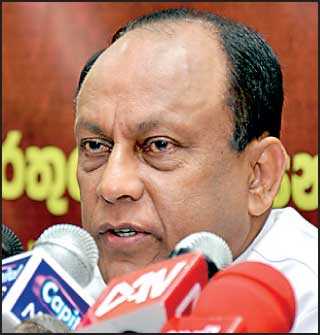Tuesday Feb 17, 2026
Tuesday Feb 17, 2026
Wednesday, 12 February 2020 00:18 - - {{hitsCtrl.values.hits}}
By Nuwan Senarathna
President Gotabaya Rajapaksa may request a moratorium on loan payments from China in order to create policy space for economic revival, Information and Communication Technology State Minister Lakshman Yapa Abeywardena said yesterday.
 |
Information and Communication Technology State Minister Lakshman Yapa Abeywardena - Pic by Lasantha Kumara |
His statements come in the wake of Prime Minister Mahinda Rajapaksa telling The Hindu in an interview over the weekend that the Sri Lankan Government had requested the Indian Government for a similar moratorium for three years and expressed optimism that if India agreed, other countries may follow suit.
Speaking to reporters at the Media Ministry, Abeywardena said the Government expected China to agree to a moratorium, expressing optimism that the global economic powerhouse would align with the precedent set by India for a moratorium on loan repayments.
“The President might request the Chinese Government for a moratorium. The Government is expecting that if India agrees there is a chance that China will also agree for a debt repayment moratorium,” he said.
However, the State Minister did not disclose when or how such a request would be made. President Rajapaksa was expected to undertake a state visit to China in January but it was postponed due to other engagements. The outbreak of coronavirus in China is likely to deter any visits in the near future.
Abeywardena argued that if both China and India agreed to a debt moratorium, even for a short period of time, there might be a chance to revive the economy. According to Abeywardena, the moratorium will offer a chance to increase the country’s exports and Government revenue, leading to stronger macroeconomic fundamentals.
“We hope India will respond positively to Mahinda Rajapaksa’s request. This move will help us to breathe freely for a while and put the economy on the correct track. If we take the correct decisions, increase export earnings and post stronger growth there is a chance to manage debt repayments better,” he added.
Abeywardena argued that the International Monetary Fund’s (IMF) latest assessment had shown that the Government was taking correct policy decisions to help the economy recover from a prolonged growth slump. He was also optimistic over the IMF projecting the country’s growth at 3.7% for 2020.
“The IMF’s latest assessment shows that we are on the right track and the country’s economy is slowly but surely recovering from the Easter Sunday attacks. The Government is committed to taking the necessary measures to recover growth.”
Sri Lanka’s debt repayment for 2020 is estimated to be $ 4.8 billion by the Central Bank. However, a large part of Sri Lanka’s debt, over 40% according to some estimates, is raised from international capital markets. Bilateral debt from China is estimated to be less than 20% of the country’s debt portfolio, and mostly comes from Chinese State banks that have given loans tied to large-scale infrastructure projects in Sri Lanka. Sri Lanka also has significant borrowings from development agencies such as the Asian Development Bank, World Bank and others, although most of this debt consists of long-term concessionary loans.
Sri Lanka has high debt repayments pending until around 2023 and after a short respite of one year, will again face large repayment obligations from 2025 onwards. The former Government considered restructuring Sri Lanka’s considerable debt but failed to make much headway during its term. In 2019, Sri Lanka repaid $ 5.6 billion and the next large repayment of a $ 1 billion bond is scheduled for October 2020. The Government is expected to go to markets after the General Election to raise funds to bolster reserves and prepare for debt repayments, analysts have said.